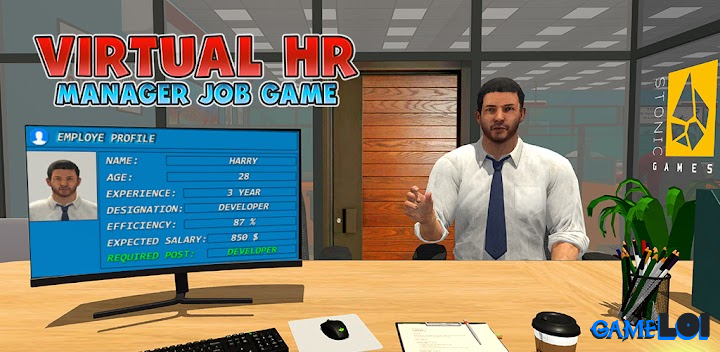Introduction to HR Manager: A New Era in Simulation Games
The rise of simulation games has captivated audiences worldwide, offering players the chance to step into various professional roles, manage intricate responsibilities, and make crucial decisions that impact their virtual environments. Among these captivating games, “HR Manager” stands out as an original simulator designed exclusively for Android devices. With its high-quality design and intricate gameplay mechanics, it immerses players in the dynamic world of human resources management.
Gameplay Overview
In “HR Manager,” players assume the role of a corporate manager responsible for overseeing the hiring process of a large company. This simulation game places a heavy emphasis on the meticulous task of selecting the right candidates for various office positions. The game challenges players to navigate through several responsibilities, predominantly focusing on evaluating potential employees. Throughout the gameplay, users will engage in numerous tasks, such as studying candidates’ dossiers, conducting interviews, assessing their psychological profiles, and administering skill tests.
Each action taken within the game must be performed with deliberation and care, as the stakes are high. The success of the company hinges on the quality of its hires, and it is up to the player to ensure that the best candidates are chosen.
Dossiers and Candidate Evaluation
One of the most significant aspects of “HR Manager” is the detailed dossiers that players will review. Each candidate comes with a unique background, experience level, and specific attributes that reflect their suitability for different positions. Players must sift through these documents, highlighting vital pieces of information that will influence their hiring decisions.
The gameplay encourages critical thinking as users must identify not just qualifications but also pitfalls—those details that might indicate an issue with the candidate. Players must balance their judgment based on experience, personality traits, and unexpected characteristics displayed in the dossiers. Neglecting these subtleties could lead to costly mistakes not only for the candidates but also for the player’s standing in the company.
Conducting Interviews
Once players have narrowed down their selections, it’s crucial to conduct interviews. This part of the game is where every player’s interpersonal skills come into play. Effective communication and an understanding of human behavior are essential to extracting valuable insights from the candidates during their interviews.
Players will find themselves facing diverse candidates, each with their unique demeanor and responses. The game presents various dialog options, and players must choose wisely to either build rapport or provoke anxiety in a candidate. The results of the interview can vary significantly depending on the questions posed and how players choose to engage with the candidates. Conducting interviews adds an unpredictable, thrilling layer to the simulation experience.
Psycho-emotional Assessment
Another intriguing feature of “HR Manager” lies in the psycho-emotional state assessments. The game incorporates simulations that evaluate how candidates might react under pressure, their compatibility with the company’s culture, and their emotional intelligence. Players can utilize a variety of tests designed to gather insights into the candidates’ psychological profiles, ensuring an informed hiring decision.
By analyzing candidates through these psycho-emotional lenses, players can predict potential performance and how candidates might handle challenges within the workplace. This assessment component enhances the realism of the simulation, reflecting the critical nature of emotional intelligence in successful team dynamics.
Skills Testing: A Critical Step
Part of the hiring process involves assessing the skills of potential employees, ensuring that they are well-equipped for the position they are applying for. “HR Manager” incorporates various skill assessments that players can administer to candidates. These tests can range from role-specific challenges to aptitude evaluations, gauging a candidate’s capabilities in real-time.
Administering these skill assessments allows players to provide valuable feedback and insights into a candidate’s ability to perform essential job functions. Therefore, creating and executing effective testing strategies is crucial to ensuring the company’s growth and success.
Office Dynamics: Free Movement and Interaction
To create a fully immersive gaming experience, “HR Manager” allows players to navigate freely through the different departments within the company. This movement not only enriches the gameplay but also introduces additional layers of interaction and exploration. As players wander through the office, they can engage with other characters and staff, develop relationships, and observe workplace dynamics firsthand.
This aspect of the game encourages players to maintain a holistic view of the company culture. By witnessing the daily operations and interactions among existing employees, players gain insights into what makes a candidate a good fit for a particular position. Being aware of the overall environment enhances strategic decision-making when it comes to placements.
Potential Pitfalls: Navigating Challenges
As engaging as “HR Manager” can be, the game also presents players with challenges and potential pitfalls. The attention required when studying personal files is paramount; overlooking critical details can lead to not only poor hiring choices but also sets off a chain reaction that affects the entire company’s productivity and morale.
Players must constantly mitigate risks while







